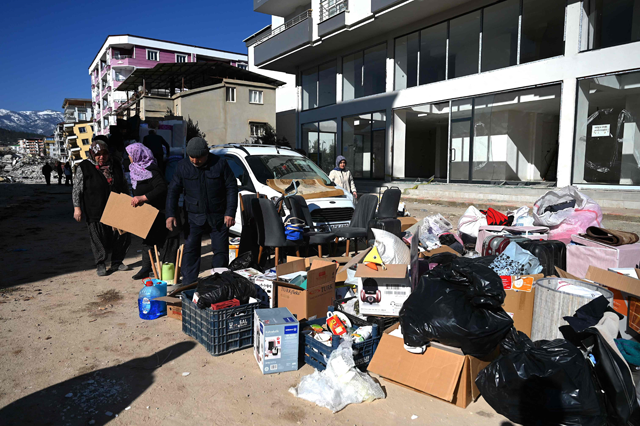ANTAKYA, Turkey — An aid convoy on Tuesday passed through a newly re-opened border crossing into rebel-held north Syria, where help has been slow to arrive since last week's earthquake, which killed nearly 40,000 people in the region.
Rare survivors were pulled from the debris eight days after the 7.8-magnitude quake struck Syria and Turkey, but the focus has switched from rescue to providing food and shelter to millions in need.
A caravan of 11 United Nations trucks entered Syria through the re-opened Bab Al Salama border point, after Damascus agreed to let the world body use the crossing for aid.
Before the earthquake struck, almost all the crucial humanitarian aid for the more than 4 million people living in rebel-controlled areas of northwest Syria was being delivered through just one crossing.
The trucks were loaded with essential humanitarian assistance, including shelter materials, mattresses, blankets and carpets, Paul Dillon, a spokesman for the UN's International Organisation for Migration (IOM), told AFP.
Activists and local emergency teams have decried the UN's slow response to the quake in rebel-held areas, contrasting it with the planeloads of humanitarian aid delivered to government-controlled airports.
The United States, which refuses ties with Syrian President Bashar Assad, called on both the government and rebels to work to allow in aid.
"Everyone should put aside their agendas and affiliations in service of one pursuit and one pursuit only, and that's addressing the humanitarian emergency — the humanitarian nightmare — that's unfolding in parts of northwest Syria," State Department spokesman Ned Price told reporters in Washington.
The UN also launched an appeal for $397 million to cover three months of "life-saving relief" for victims in Syria and said it was close to a similar plan for Turkey.
"Millions of people across the region are struggling for survival, homeless and in freezing temperatures," UN Secretary-General Antonio Guterres said.
A handful of survivors have continued to be pulled from the rubble, including four on Tuesday, defying belief almost 200 hours after the disaster.
However, keeping them alive after being buried for so long is a battle.
“It’s a miracle to find a patient still alive under the rubble,” doctor Yilmaz Aydin told AFP.
“From now on, the survivors are likely to be in a more critical condition. The majority of them will need life-saving treatment,” said Aydin.
One survivor was 25-year-old Syrian woman Abir, who spent 180 hours trapped under the rubble.
“Her heart stopped two times but we managed to bring her back,” said doctor Nihat Mujdat Hokenek.
However, many are devastated that rescuers were unable to find even the remains of their loved ones.
“We have reached the point where we could simply be happy to find the corpses,” said a civil servant in Antakya who requested anonymity for fear of losing her job.
She lost her brother and her sister-and-law in the quake.
“We are so desperate that the hope of finding corpses is all we have,” she said.
‘Mind-boggling’
Fears have grown for survivors on both sides of the border, with the UN saying more than 7 million children have been negatively impacted between Syria and Turkey, and noting fears that “many thousands” more had died.
“It is tragically clear that numbers will continue to grow,” said James Elder, spokesman for the UN children’s agency UNICEF, adding that the final toll would be “mind-boggling”.
The confirmed death toll from the quake stands at 39,106 as officials and medics said 35,418 people had died in Turkey and at least 3,688 in Syria.
Following the disaster, residents faced the hard realities of surviving in cities turned to ruin in the middle of the winter freeze.
In Turkey’s Kahramanmaras, huge crowds depended on a single toilet that still functioned in a central mosque.
“I walk 5 kilometres every day to come here for a toilet. We cannot find any other place,” Erdal Lale, 44, told AFP.
The acrid smell of smoke from hundreds of fires lit to keep away the cold permeated much of Turkey’s disaster zone.
“We need to take showers. There is a need for washing machines for clothes,” Duz said.
